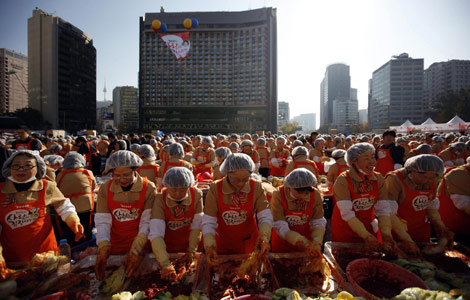China faces challenges in maintaining growth
Updated: 2012-11-17 12:46
(Xinhua)
|
||||||||
 |
|
A construction worker installs scaffolding on the top of a building at sunset in Shanghai November 13, 2012.[Photo/Agencies]
|
BEIJING - In an exclusive interview with Xinhua, CNN Beijing Bureau Chief Jaime FlorCruz said the new Chinese leadership faces the challenge of maintaining high economic growth in wake of the global economic downturn, as well as better projecting itself to the world.
As a journalist who has extensively covered China for over three decades, FlorCruz said the new Chinese leaders inherit a situation in which China has enjoyed rapid economic growth in the past twenty years and emerged as the world's second biggest economy.
"But China faces the challenge of keeping this high economic growth and creating millions of jobs, because it needs to be done at a time when there is an economic downturn in China and overseas," he said.
In the third quarter, China's GDP grew 7.4 percent compared to the previous year. It was the seventh consecutive quarter of slowing growth, against the backdrop of China's aim to tame inflation and its real estate bubble.
To cope with the slowing economic growth, FlorCruz believes the mid-to-long-term solution lies in the development of the service sector.
"There needs to be more encouragement for the growth in the private sector, and especially in the service sector, because China can no longer rely on the manufacturing.
"China needs to shift its economic model from being the factory of the world to the innovator of the world. So it needs more development in the service sector, and that could be the next growth area for China," he said.
A report by the Ministry of Agriculture said in the first three quarters of this year, the urban-rural income ratio has narrowed to 2.72 to 1, down from 2.77 to 1 in the same period last year, and the gap has been on the decline for three consecutive years.
But the overall wealth gap in China has given rise to social conflicts in recent years, and FlorCruz sees it as a major obstacle for China's economic reform.
"It's probably unavoidable to have gaps, but China cannot tolerate this growing gap," he said, adding that taxation and greater investment in the western part of the country could help alleviate problems stemming from income disparities.
FlorCruz first came to China in 1971 and has stayed thereafter, thus witnessing the country's gradual opening up and its efforts to be understood by the world. But even today he says China needs to project and explain itself better to be understood overseas.
"Without such understanding, China is either depicted as very very dark or very very rosy. The truth is somewhere in the middle. I think China needs to be looked at as a whole.
"China has its redeeming virtues and values, but China also has its set of problems. China has made a lot of successes, but China also faces a lot of challenges," he said.
He added that a strong and stable China is beneficial for the world.
"What the world doesn't want to see is an unstable China, nor a China that's in chaos. Because we've seen what it's like before, and it's not pretty. I think the world hopes that China will be a positive force as a strong power," he said.











